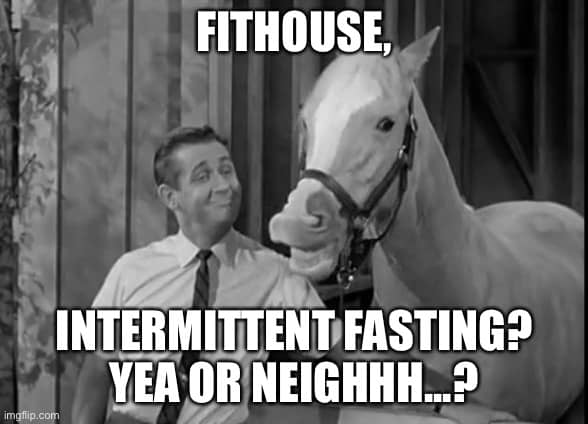Letter to the editor: Howdy Chris, I was hoping you could shed some light on a subject I feel left in the dark on, but there’s a big IF involved, and that IF is Intermittent Fasting. It seems to be all the rage online, and I’m curious—does it work? Should I take a gander? So much confusion; please show me the light!
Respectfully,
Wilbur Post
Broken Arrow, OK
Greetings Wilbur,
Like anything in life, what works for one may not work for another, and a horse is a horse, of course, of course. To the best of my knowledge, the guy who popularized fasting in our country was a gent named Bernarr Macfadden. Funny story, I collect books and manuals from strength training and bodybuilding history. My wife and I were once visiting Naples, NY, and the town library was having a book sale; guess who’s out-of-print book I found for a country nickel? Mr. Macfadden’s. Life is funny, Wilbur; sometimes you get, and sometimes you get got.
Intermittent fasting is not a “diet.” It’s simply an eating pattern. You could do keto intermittent fasting, zone diet intermittent fasting, carb cycling intermittent fasting, high carb intermittent fasting—the possibilities are endless. So before you even begin, you would need a daily number of calories and macronutrients. Nothing magic happens in your body from fasting during the day and then feeding at night; it doesn’t give you a license to eat whatever you want. The rules of nutrition still apply.
Typically, there are two protocols: 1. Select days where your caloric intake is dramatically lowered or even completely restricted. 2. Time-restricted eating, where all your calories for the day are consumed during a short time window (usually between 4-8 hours).
Calorie for calorie, you will lose no additional body fat using the eating pattern of intermittent fasting vs eating three meals a day or eating six meals a day. That part is non-negotiable. I know, I know; everyone knows someone who started intermittent fasting and lost some weight. Well, the reality is, that person probably lowered his calories naturally because of the time restriction and lost weight as a result of his accidental caloric deficit (honestly, he probably never even figured out calories in the first place). Had he eaten those same calories spread evenly throughout the day, fat loss would be equal.
If fat loss is equal, what are the pluses of Intermittent Fasting?
1. There are studies that show many benefits including improving metabolism, improving heart health, improving gut health, lowering inflammation, and increasing longevity of life. However, when adjusting calorie for calorie, there is no evidence to show that intermittent fasting is a superior protocol vs. continuous caloric restriction using another eating pattern (like three meals a day). You would receive the same benefits from both.
2. The major plus is that it may benefit someone’s lifestyle and schedule more than another eating pattern; it’s convenient and simple. Someone might hate eating breakfast and prefer not to eat until dinner time. Someone in a caloric deficit may prefer taking a few big hits during the week as a tradeoff for eating more food the rest of the time. Another person may prefer fasting during the day as a means to feeling more satisfied from a larger dinner at night; it psychologically makes eating in a caloric deficit more bearable for him. It might suit someone’s neurotransmitter profile better; someone may be more neurologically potentiated through fasting and more satisfied with a larger feeding later in the day.
Are there any negatives to intermittent fasting?
1. For most people, intermittent fasting is not a good way to build muscle. Of the many reasons, one is that due to its nature, the anabolic window during the day is too short to promote maximal anabolism (muscle building in this instance).
2. Someone who’s neurotransmitter profile naturally produces lots of cortisol or someone who is constantly under stress may even gain fat using intermittent fasting. Why? Continuous cortisol elevation can decrease the active thyroid hormone in your body (which will lower your metabolic rate) as well as begin to lead to insulin resistance. Yes, chronically elevated cortisol can “slow your metabolism,” even if you’re eating more than enough calories.
3. Women are more sensitive to cortisol than men and generally will not do as well on intermittent fasting. It may also lead to dysregulation of reproductive hormones in women.
Should you do it? It depends! It depends on your lifestyle, on your goals, on your preferences; it’s too individualized to give a blanket answer. I hope you understand that my answer is a general overview and NOT a guide on how to effectively use intermittent fasting. Again, the rules of nutrition still apply; you’d need to figure out all of the normal starting nutrition info and then plug it into an intermittent fasting eating pattern that suits you if you wanted to take it for a test ride.
Thanks for the question, Wilbur, I hope this helped; on that note, I’m going to ride off into the sunset, cowboy.
About the author

Chris Rombola
Chris is the owner of Fit House. He's run the training departments at several commercial gyms, and after years of seeing how awful those environments were for his clients, he opened his own studio. He is devoted to getting people strong, lean, and healthy.


Recent Comments